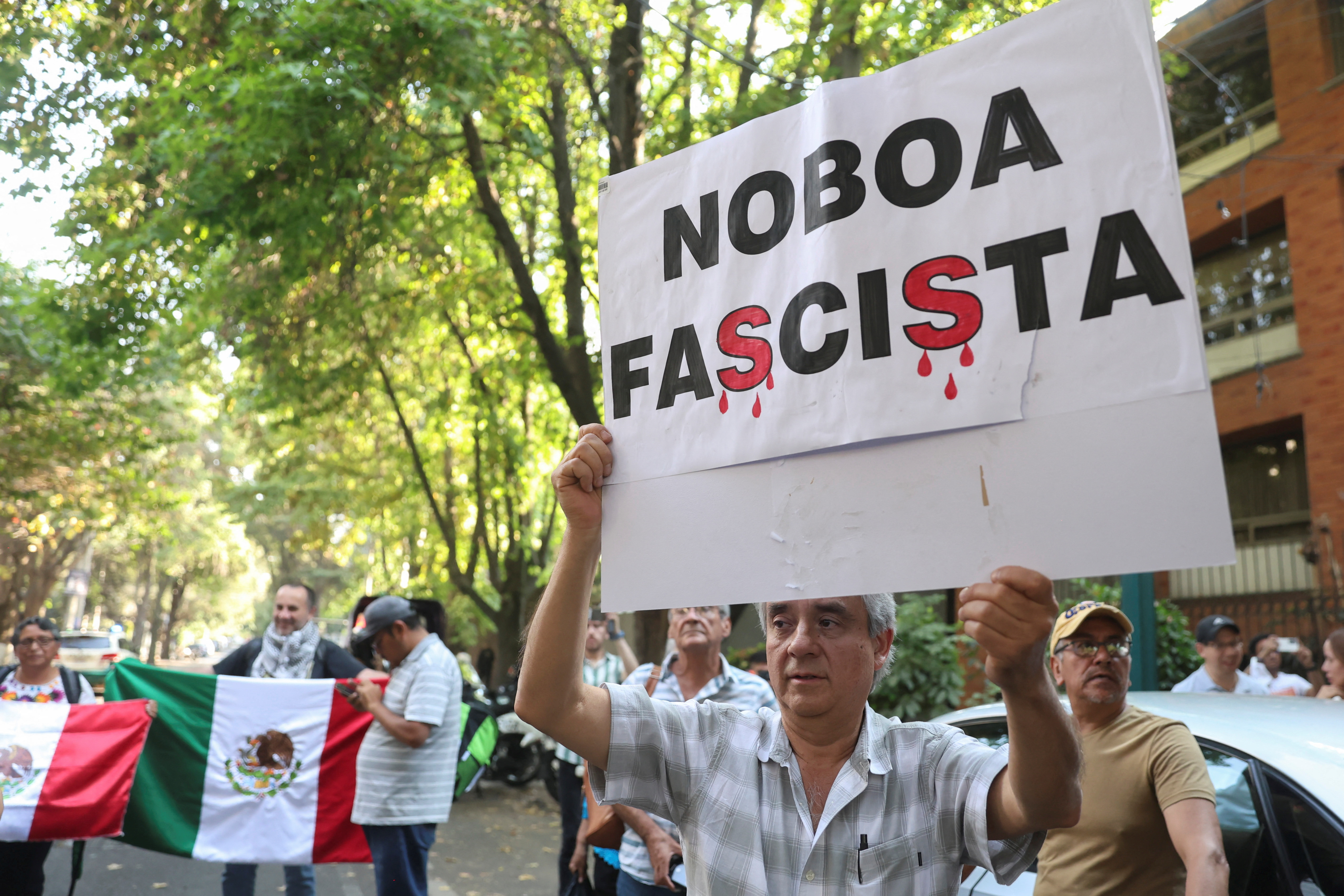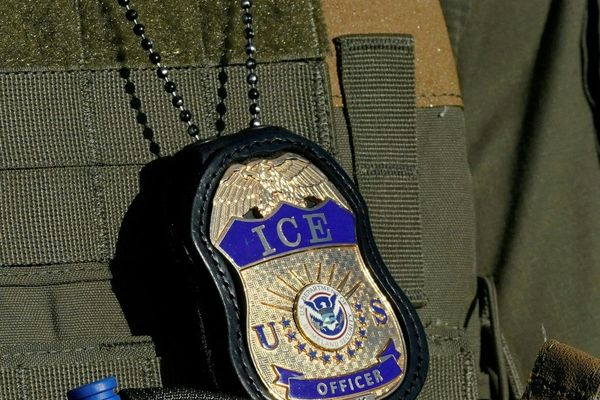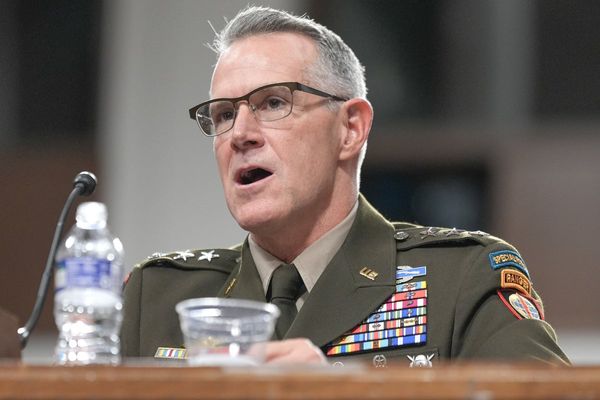
Mexico’s Ministry of Foreign Affairs has released footage of the police raid on its embassy in Quito, Ecuador, calling the law enforcement action an “unauthorised and violent break-in”.
In an accompanying statement on Tuesday, published both in Spanish and English, the ministry blasted Ecuador for violating international accords protecting embassies from law enforcement interference.
“The world witnessed the violence, abuse and mistreatment of our Mexican personnel at the hands of the Ecuadorian police and the violation of the immunity of our embassy in Ecuador,” the statement said.
“Mexico will bring these violations of international law to the international courts and tribunals with the support of friendly countries.”
The video captured Friday’s successful attempt to arrest former Ecuadorian Vice President Jorge Glas, who had sought refuge within the embassy walls after being convicted on corruption-related charges.
Clips show Ecuadorian police gathering outside the walls of the embassy late at night, with one officer scaling the barrier, gun in hand.
Then the footage cuts to security cameras inside the embassy, where police burst in through the door and point a gun at Mexican diplomat Roberto Canseco, who attempts to block their path.
Canseco is later shown being thrown to the ground outside the embassy, as he tries to prevent law enforcement vehicles from leaving the property with Glas.
During his daily news conference on Tuesday, outgoing Mexican President Andres Manuel Lopez Obrador addressed the footage. He reiterated the foreign ministry’s warning that the storming of the embassy would have consequences in international court.
“Mexico is an independent and sovereign country, and we will not allow anyone’s meddling in it,” he told reporters.
▶️ The world witnessed the violence, abuse and mistreatment of our Mexican personnel at the hands of the Ecuadorian police, and the violation of the immunity of our embassy in Ecuador.
Mexico will bring these violations of international law to the international courts and… pic.twitter.com/rLAOOS3EnZ
— Relaciones Exteriores (@SRE_mx) April 9, 2024
Tense relations
The police raid ruptured the already tenuous relationship between Ecuador and Mexico.
On Friday night, in the wake of the raid, Mexico officially severed diplomatic ties with Ecuador, recalling its diplomatic staff from Quito.
Over the weekend, Mexico’s Secretary of Foreign Relations Alicia Barcena said the employees came home “with their heads held high”, posting pictures and praising “the defence they made of our sovereignty”.
Tensions between the two countries started to simmer last week after President Lopez Obrador commented on Ecuador’s recent presidential elections.
He suggested that media scrutiny over the assassination of an Ecuadorian presidential candidate helped tip the outcome of the race last year.
Those comments led to Ecuador naming Mexico’s ambassador, Raquel Serur Smeke, a “persona non grata” in the country. In her absence, Canseco became the highest-ranking official at the Mexican Embassy.
While the spat over the election comments was unfolding, the Mexican Foreign Ministry issued a statement offering political asylum to Glas, who had been sheltering in the embassy since December.
Glas was one of the many Latin American politicians caught up in the Odebrecht corruption scandal, named for a Brazilian construction company.
He and other officials across the region were accused of accepting bribes in exchange for inking favourable government contracts with the company. Glas, for example, faced allegations of pocketing $13.5m in bribes.
He was convicted twice in relation to the corruption scandal: once in 2017, for which he was sentenced to six years in prison, and once in 2020, resulting in an additional eight-year sentence.
But Glas, who served in the left-wing government of former President Rafael Correa, has repeatedly alleged he is a victim of political persecution.
Before Friday’s police raid, the Mexican Foreign Ministry warned that police had started to gather outside its embassy walls in Ecuador. Police in the country have long sought to enter the embassy and arrest Glas.

International outcry
International law, like the 1961 Vienna Convention on Diplomatic Relations, protects embassies and consulates as spaces off limits to local law enforcement.
That principle — often known as the “rule of inviolability” — allows for diplomatic affairs to be conducted without police or military interference.
But it has also been used to protect figures seeking to dodge prosecution or other threats they might face in a given country.
On Tuesday, United States National Security Adviser Jake Sullivan joined in the international condemnation of the Quito embassy raid, referencing the newly released footage from a White House podium.
“We’ve reviewed the security camera footage from the Mexican embassy and believe these actions were wrong,” he said.
“The Ecuadorian government disregarded its obligations under international law as a host state to respect the inviolability of diplomatic missions and jeopardised the foundation of basic diplomatic norms and relationships.”
He added that the US has “asked Ecuador to work with Mexico to find a resolution to this diplomatic dispute”.
The Organisation of American States (OAS) is scheduled to hold a meeting on the embassy raid on Wednesday in Washington, DC, something Sullivan said the White House welcomed.
But on Tuesday, Mexican President Obrador expressed frustration with the US, as well as Canada, calling their statements on the matter lukewarm and “ambiguous”.
“We are neighbours. But their position was very undefined,” he said.
Ecuador’s President Daniel Noboa, meanwhile, has defended his country’s actions.
“Ecuador is a country of peace and justice, which respects all nations and international law,” he wrote in a statement posted on social media on Monday.
For his part, Glas returned to prison in Guayaquil, Ecuador, on Tuesday after a brief hospital stay: He had reportedly been refusing to eat after his arrest.







